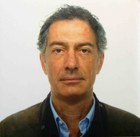
Principal Investigator for the UNIBO team and Project Coordinator
Nicolò Marchetti has a long experience in archaeological research in Western Asia, notably in Syria, Palestine, Turkey and Iraq. As scientific director of several excavation projects at important sites therein, he gave equal significance to the investigation of ancient remains and their fruition by the public through the creation of archaeological parks. The latter, addressed to both local communities and tourists, are acting as meaningful elements for the cultural and economic development of the surrounding areas. These activities have been implemented also through his coordination of several now-concluded cooperation projects such as ARCHAIA, WALADU, EDUU, BANUU and, more recently, KALAM. He coordinates the online platform OrientLab, which provides dynamic maps marking historical sites and landscapes, also in relation to potential threats in selected areas of Turkey, Syria, Iraq and Egypt. He directs the Nineveh and Aqar Quf excavations and the Abu Ghraib and Samarra South survey projects in Iraq.
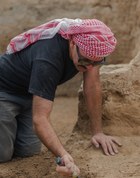
Principal Investigator for the UNICT team
Nicola Laneri teaches Archaeology of the Ancient Near East at the University of Catania and is Director of the School of Religious Studies at CAMNES (Florence). He taught at the University of Chicago, the Middle East Technical University of Ankara, and the Oriental Institute of Naples and he is Principal Investigator of the PRIN 2020 project Godscapes: Modeling Second Millennium BCE Polytheisms in the Eastern Mediterranean. He currently directs two international archaeological missions: the Baghdad Urban Archaeological Project (BUAP) at Tell Muhammad (Iraq) and the Ganja Region Kurgan Archaeological Project (GaRKAP) in western Azerbaijan, co-directed since 2017 with the National Academy of Sciences of Azerbaijan. From 2003 to 2016, he directed the Hirbemerdon Tepe Archaeological Project in southeastern Turkey, and has also worked in Iran and Syria. From 2001 to 2011, he was a member of ISMEO/IsIAO. Laneri was a Fulbright Research Scholar and Fellow at Columbia University, and has held visiting and research positions in Ankara, Chicago, and Leiden. He has organized numerous international conferences and workshops, and regularly presents at leading institutions. His scholarly output includes over 120 publications in academic journals and edited volumes. In 2024, he was awarded the Laurentum Prize in the category “Save the Cultural Heritage”.
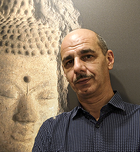
Principal Investigator for the CRAST team
Carlo Lippolis is Professor of Archaeology and Art History of Ancient Western Asia and the Ancient Eastern Mediterranean at the University of Turin, and President of the Centro Ricerche Archeologiche e Scavi di Torino per il Medio Oriente e l'Asia (CRAST). He is specialized in the study of the spread of the Hellenistic culture during the Parthian period in Central Asia and the civilizations of the ancient Near East. He is director of the scientific journals Mesopotamia e Parthica. Since 2011 he has coordinated the restoration works of the Iraq Museum of Baghdad. He is director of the excavations at Parthian Nisa (Turkmenistan), co-director of the excavations at Seleucia on the Tigris (Iraq) and vice-director of the Crast's archaeological project in Mongolia (Bayangol valley, Karakorum Museum). For his field researches, in 2013 and 2024 he was awarded by the President of Turkmenistan with International Cultural Prizes.
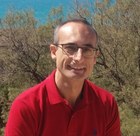
Principal Investigator for the AVSI team
Agronomist with a MA in Rural Development Cooperation and more than 21 years of experience in Development Cooperation in Latin America and the Caribbean, the Maghreb, and the Middle East, he is currently Legal Representative of AVSI in Iraq and Regional Program Implementation Manager for the MENA region.
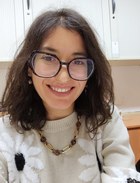
Member of the UNIBO coordination team
Currently a Research Fellow at the Department of History and Cultures, University of Bologna (UNIBO), Claudia D’Orazio holds a PhD in Archaeology. Her research interests include the study of material culture (such as glyptic, sealing practices and popular art) of the Levant and Mesopotamia during the Late Bronze and Iron Ages, its distribution and consumption as evidence of mobility and exchange across communities. Since 2017 she has been a member of different archaeological expeditions in Turkey (Karkemish) and in Iraq (Nineveh) as area supervisor and finds registrar. Since 2024 she has been conservator of the Post-Digital Museum of the Ancient and Middle East based at the University of Bologna.
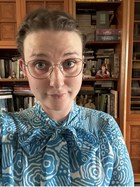
Member of the UNIBO coordination team
Currently a Research Fellow at the Department of History and Cultures, University of Bologna (UNIBO), Eleonora Mariani holds a PhD in History. She has been extensively trained as a field archaeologist and pottery specialist, gaining hands-on experience through collaborations with several archaeological missions in Iraq (QADIS, Nineveh, Aqar Quf) and Turkey (Karkemish). Her primary research interests include the evolution of pottery technology, the study of pottery assemblages and, in general, the settlement patterns and material culture in Southern and Central Mesopotamia between the 3rd and the 2nd millennium BCE. She has actively participated to EU-funded projects WALADU and EDUU, where she played a key role in capacity-building initiatives. In particular, she was involved in the training of Iraqi heritage professionals, with a focus on developing technical skills in archaeological material documentation and drawing.
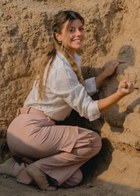
Member of the UNICT team
Aurora Borgesi is Research Fellow within the PRIN 2020 (MUR) project “Godscapes: Modeling Second Millennium BCE Polytheisms in the Eastern Mediterranean”, based at the University of Catania, where she earned her Master’s degree in Archaeology with a specialization in Near Eastern and a specific focus on Old Babylonian iconographic studies. She has been engaged in international excavation projects since 2022, including the Azerbaijani-Italian joint mission Ganja Region Kurgan Archaeological Project(GaRKAP), the Baghdad Urban Archaeological Project (BUAP), and the Eshnunna Survey Project in the Diyala Governorate (Iraq). As part of these missions, she has gained solid experience in photogrammetric surveys using advanced technologies such as mirrorless cameras, laser scanners, and RTK/GNSS multi-constellation drones. She is a certified U.A.S. (Unmanned Aircraft System) pilot, qualified for these operations in the field.
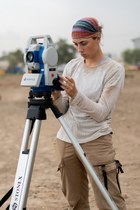
Member of the UNICT team
Alice Mendola is PhD Student in Heritage Science at Sapienza University of Rome. She is currently working on a research project exploring the agency of fire and its material traces across the Southern Caucasus and Mesopotamia, integrating archaeological data and archaeometric analysis. She earned her Master’s degree in Archaeology from the University of Catania, with a dissertation focused on the Kura-Araxes kurgans of the Uzun Rama plateau in Western Azerbaijan. Since 2019, she has been actively involved in international excavation projects, including the Azerbaijani-Italian joint mission GaRKAP (Ganja Region Kurgan Archaeological Project) in Western Azerbaijan, and the Baghdad Urban Archaeological Project (BUAP), focused on the site of Tell Muhammad in Iraq.
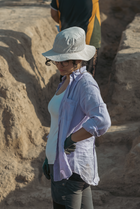
Member of the UNICT team
Rachele Mammana is a PhD student in Heritage Science at Sapienza University of Rome. Her project addresses the ongoing challenges of earthen heritage conservation in Ancient Mesopotamia by integrating archaeological methods with digital technologies, specifically through the development of a semantic ontological model for the documentation and analysis of earthen architecture. Since 2021, she has participated in several international archaeological missions, including the Azerbaijani-Italian joint project in Western Azerbaijan (GaRKAP), the Baghdad Urban Archaeological Project (BUAP), and the Eshnunna Survey Project in central Iraq. She brings expertise in archaeological illustration and pottery analysis, drawing on her background in fine arts and her academic training in archaeology, gained through her Master’s thesis on ceramic traditions in the Caucasus between the Late Bronze and the Early Iron Ages.

Member of the UNICT team
Chiara Pappalardo is Research Associate in Archaeology of the Ancient Near East at the University of Catania, where she obtained her PhD with a dissertation titled “Visible Dead: Ancestral Landscapes in Prehistory between the Eastern Mediterranean and the Near East”. Her current focus is the analysis of the material data related to religiosity in the Levant during the second millennium BCE through a semantic approach. During her graduate studies, she spent several research semesters in Austria (Universität Wien; ÖAW) and Germany (Freie Universität Berlin) and has participated in numerous international field research projects in the Middle East. She is currently member of archaeological missions in Azerbaijan (GaRKAP – Ganja Region Kurgan Archaeological Project) and Iraq (BUAP – Baghdad Urban Archaeological Project). She also contributes to the teaching of Archaeology of the Ancient Near East at her institution as a subject expert.